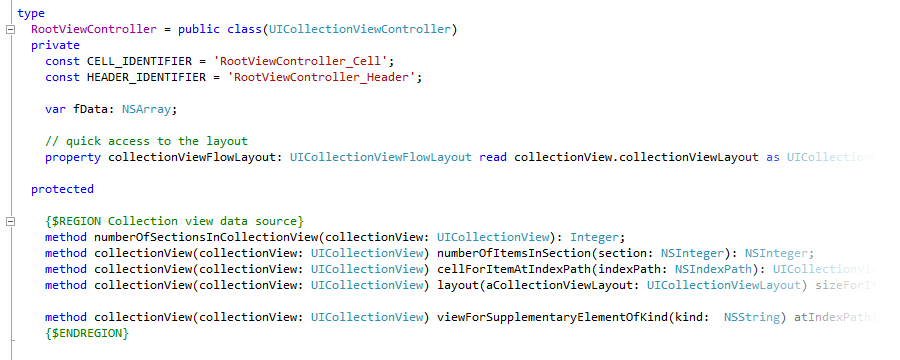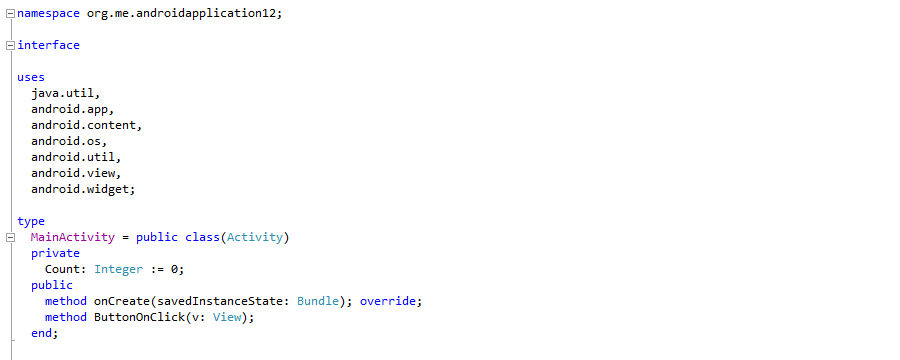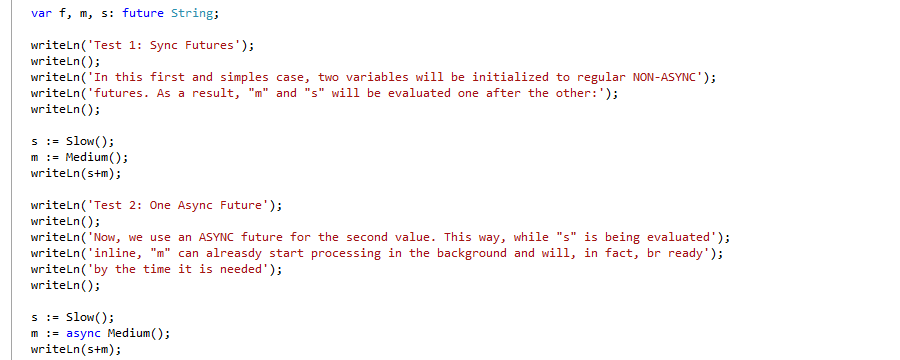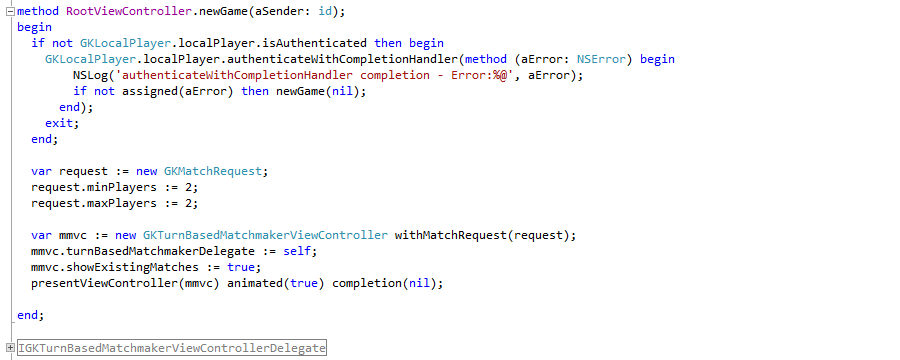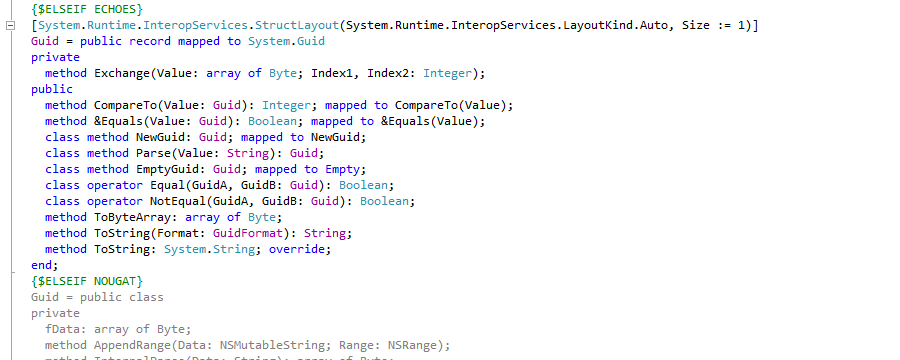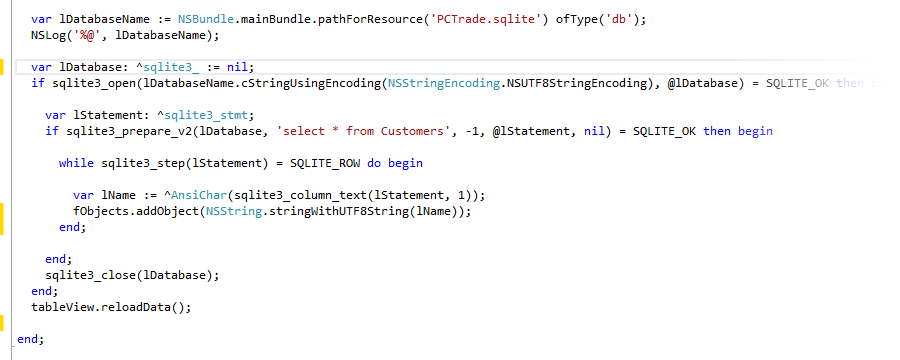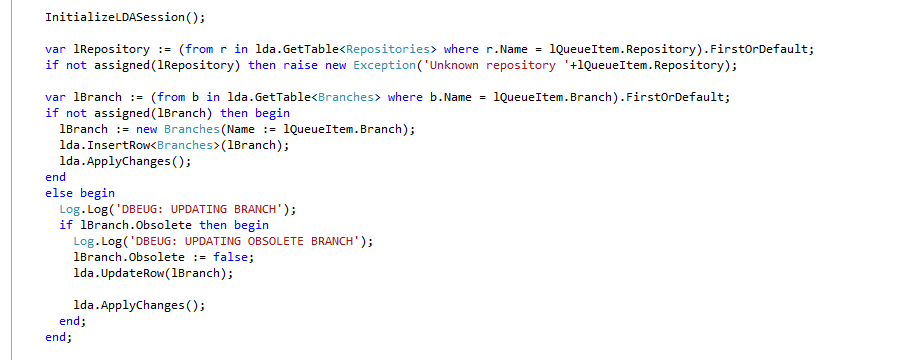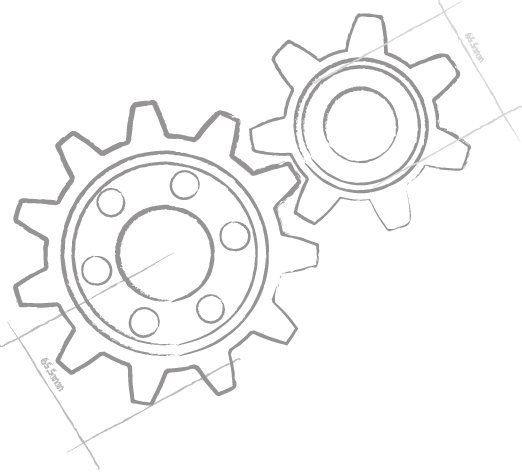Your New Favorite Language
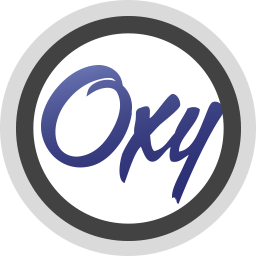 Oxygene lets you create applications and projects for all of today's major platforms – with one IDE and one great programming language.
Oxygene lets you create applications and projects for all of today's major platforms – with one IDE and one great programming language.
Oxygene is built on the foundation of Object Pascal, revamped and extended to be a modern language for the twenty-first century.
If you are a Delphi developer, you will be right at home with the Oxygene language. At the same time, it will hit you like a breath of fresh air: Oxygene's many new language enhancements make writing code enjoyable again, and the language is evolving rapidly, but in a clean and consistent way.
Oxygene lets you target all platforms truly natively. This means that whether you are developing for iOS, watchOS, tvOS, the Mac, Android, Windows Phone, the regular Windows desktop, Linux or the Web, you will be working directly with each platform's native APIs and frameworks, and using the platform's native UI widgets. No unnecessary abstractions, and no lowest-common-denominator UI.
As a result, your apps will be lean, fast, and feel native to the end-user — because they are.
Current Oxygene Release
.3049 Stable/Public, January 16. Download Trial.
The Platforms
Oxygene lets you compile your code for different target platforms. A target platform can be an operating system (such as Windows, or macOS) or a more virtualized multi-platform runtime environment (such as Java or .NET)
The same language features are available on each platform and it is really easy to share code between platforms. But first and foremost, Oxygene is a great native fit on each individual platform, giving you full access to all the native APIs, frameworks, UI widgets, and so on:
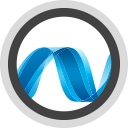 .NET – The .NET platform includes the regular .NET Framework, as well as Mono, .NET Core, ASP.NET, WinRT and Universal Windows Projects). .NET is a great target for writing Windows GUI apps, cross-platform servers (to deploy with .NET Core or Mono), command line tools, and websites. Read more.
.NET – The .NET platform includes the regular .NET Framework, as well as Mono, .NET Core, ASP.NET, WinRT and Universal Windows Projects). .NET is a great target for writing Windows GUI apps, cross-platform servers (to deploy with .NET Core or Mono), command line tools, and websites. Read more.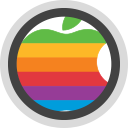 Cocoa — Build apps for Apple's macOS, iOS, iPadOS, tvOS and watchOS, based on the Cocoa frameworks. Code interacts directly with Objective-C runtime classes and APIs, and also has full access to lower-level C and POSIX APIs. Read more.
Cocoa — Build apps for Apple's macOS, iOS, iPadOS, tvOS and watchOS, based on the Cocoa frameworks. Code interacts directly with Objective-C runtime classes and APIs, and also has full access to lower-level C and POSIX APIs. Read more.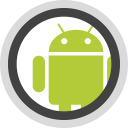 Android — Build applications for Android, both using the regular Java-based Android SDK as well as extensions using the native Android NDK (using the same language!). SDK applications give you full access to the standard Android APIs, while Android NDK extensions are great for high-performance or low-level code in Android apps that cannot easily be achieved on the Java level. Read more.
Android — Build applications for Android, both using the regular Java-based Android SDK as well as extensions using the native Android NDK (using the same language!). SDK applications give you full access to the standard Android APIs, while Android NDK extensions are great for high-performance or low-level code in Android apps that cannot easily be achieved on the Java level. Read more.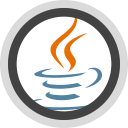 Java – Build projects for the Java Runtime and related platforms. Your code will be compiled to Java byte code that can run anywhere the Java VM is supported. Read more.
Java – Build projects for the Java Runtime and related platforms. Your code will be compiled to Java byte code that can run anywhere the Java VM is supported. Read more.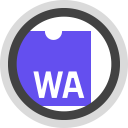 WebAssembly — Build modules that can run in the browser and interact with JavaScript and the HTML Document Object Model. Read more.
WebAssembly — Build modules that can run in the browser and interact with JavaScript and the HTML Document Object Model. Read more.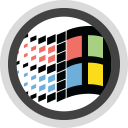 Windows (native) — Build CPU-native Windows projects against the lower-level Win32 API or using Delphi RTL/VCL. Read more.
Windows (native) — Build CPU-native Windows projects against the lower-level Win32 API or using Delphi RTL/VCL. Read more.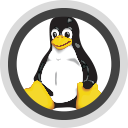 Linux — Build CPU-native Linux projects against the low-level libc and POSIX APIs. Read more.
Linux — Build CPU-native Linux projects against the low-level libc and POSIX APIs. Read more.
Read More about the Platforms or browse the Docs.
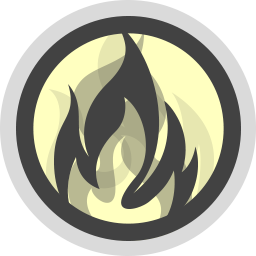
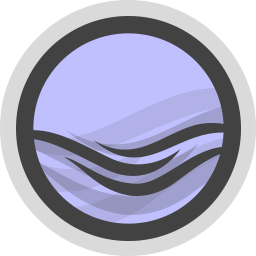
Work on Windows or Mac
Oxygene comes with Fire and Water, our own development environments for the Mac and Windows. Fire and Water rethink what a modern IDE should look like from the ground up – it's fast, lean and unobtrusive, letting you be more productive than ever. And Oxygene also integrates deeply with Visual Studio 2017 or later, if you prefer.
Whether on Windows or Mac, you can develop for all target platforms supported by Oxygene, deploy right to your iOS and Android devices, and much more.
Read More about Fire or browse the Docs.
Or read more about Oxygene in Visual Studio.
Our Customers
RemObjects' user base is as widely-ranged as its tools – from single developer shops to Fortune 500 companies and major house-hold brands, including:








Check out RemObjects C#, Swift or Iodine (Java)!

